15 Juli 2020 9 menit
Siaran Pers Bersama Koalisi Organisasi Masyarakat Adat dan Masyarakat Sipil menyampaikan laporan kepada Komite Penghapusan Diskriminasi Rasial, Perserikatan Bangsa-Bangsa menolak segala ancaman terhadap hak masyarakat adat di Kalimantan
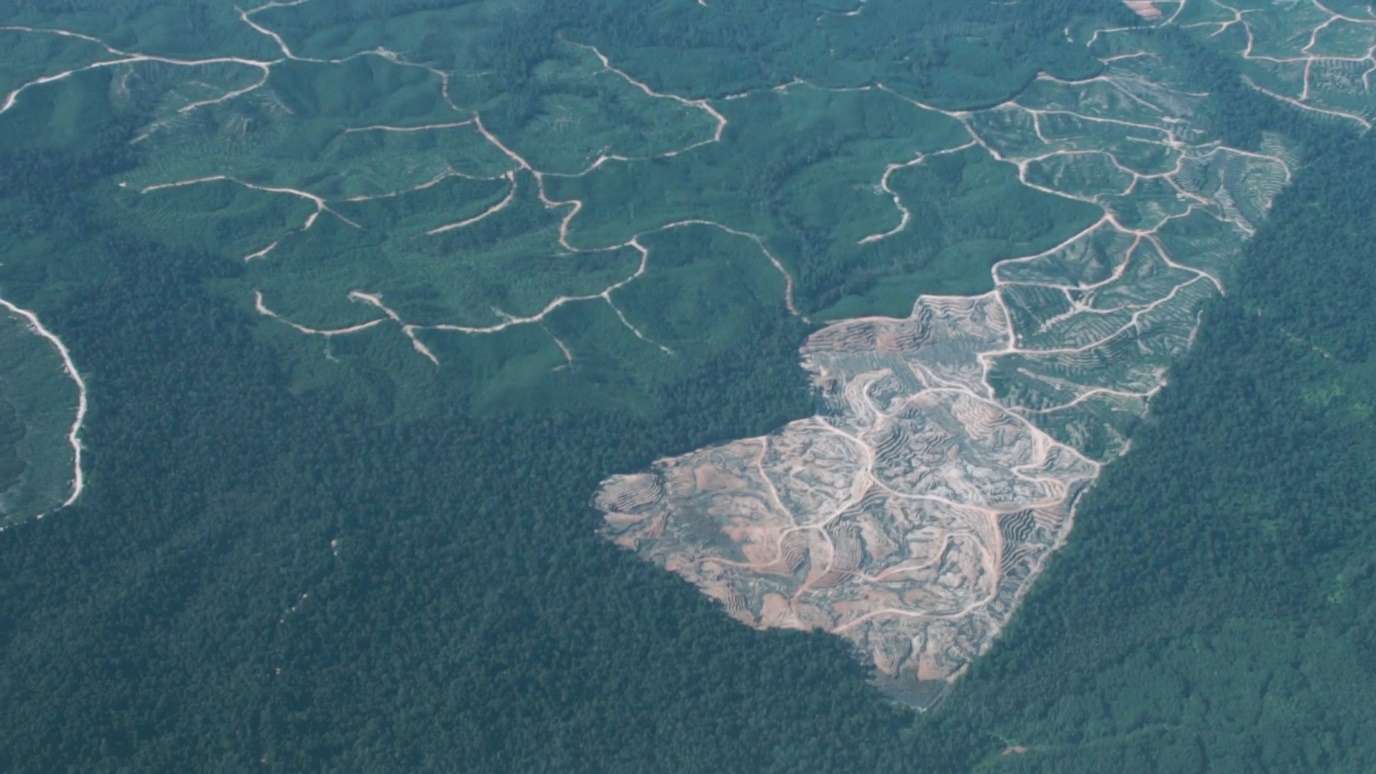
15 Juli 2020
Pada tanggal 9 Juli 2020, empat belas (14) organisasi Masyarakat Adat dan HAM di Indonesia bersama Forest Peoples Programme menyampaikan laporan kepada Komite PBB tentang Penghapusan Diskriminasi Rasial (UN-CERD) yang meminta agar Komite tersebut mempertimbangkan situasi masyarakat adat Dayak dan masyarakat adat lainnya di Kalimantan, Indonesia, di bawah prosedur peringatan dini dan tindakan segera Komite CERD.
Laporan ini menyoroti kerugian-kerugian besar yang menimpa masyarakat adat untuk pembangunan jalan dan, perkebunan dan pertambangan di sepanjang perbatasan Indonesia-Malaysia, yang semuanya membawa ancaman kerusakan segera, besar dan tidak dapat diperbaiki terhadap orang Dayak dan masyarakat adat lainnya di wilayah tersebut. Daerah ini kebetulan juga adalah wilayah leluhur dari 1-1,4 juta masyarakat adat Dayak. Beberapa komunitas telah dipindahkan secara paksa dan diperkirakan 300.000 warga adat lainnya terancam penggusuran.
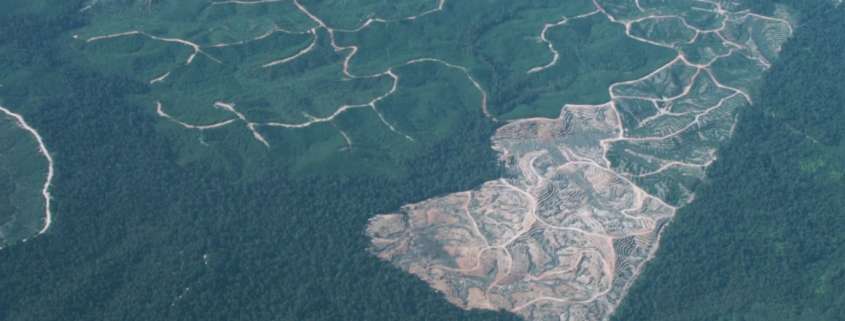 Foto udara perkebunan kelapa sawit pertama masuk perbatasan Kabupaten Mahakam Hulu, Kalimantan Timur (Angus MacInnes, 2017)
Foto udara perkebunan kelapa sawit pertama masuk perbatasan Kabupaten Mahakam Hulu, Kalimantan Timur (Angus MacInnes, 2017)
Laporan ini dibangun di atas laporan sebelumnya yang diajukan oleh sekelompok masyarakat adat dan organisasi masyarakat sipil ke Komite CERD PBB pada tahun 2007. Menanggapi bukti yang disajikan, Komite CERD PBB mencatat: “dengan keprihatinan pada rencana untuk membangun perkebunan kelapa sawit di sepanjang lebih dari 850 km perbatasan Indonesia-Malaysia di Kalimantan sebagai bagian dari [Mega Projek KBOP], dan ancaman yang ditimbulkannya terhadap hak-hak masyarakat adat untuk memiliki tanah mereka dan menikmati budaya mereka.”
Namun, Indonesia tidak hanya bersikeras dengan rencana ini, yang oleh karenanya terus-menerus mengabaikan hak-hak masyarakat adat dalam prosesnya, namun juga baru-baru ini dan secara dramatis meningkatkan ruang lingkup dan intensitasnya dan telah memulai pembangunan jaringan jalan yang luas untuk memfasilitasi perluasan ini.
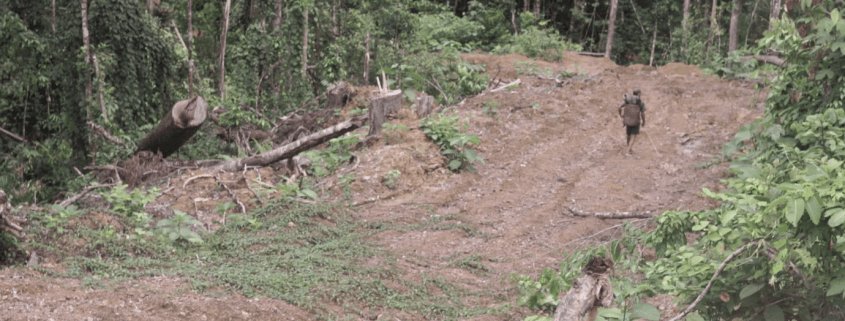 Huvat Biseh memeriksa kerusakan oleh perusahaan pembalakan kayu, PT Kemakmurah Berkah Timber (Roda Mas Group). (Angus MacInnes, 2017)
Huvat Biseh memeriksa kerusakan oleh perusahaan pembalakan kayu, PT Kemakmurah Berkah Timber (Roda Mas Group). (Angus MacInnes, 2017)
Belum terlihat ada perubahan dalam kebijakan atau praktik yang terkait dengan operasi perkebunan kelapa sawit atau penebangun mana pun di wilayah tersebut, dan (pembangunan) infrastuktur terkait. Kegawatan situasi ini semakin diperburuk oleh kerangka hukum Indonesia yang memiliki banyak kekurangan karena menyangkut masyarakat adat dan pengabaiannya yang terus-menerus dan mencolok terhadap berbagai keprihatinan dan rekomendasi jangka panjang dari banyak mekanisme pengawasan internasional dan dalam negeri (misalnya, Komnas HAM dan Mahkamah Konstitusi), termasuk Komite CERD PBB. Ini, sekali lagi, mendorong masyarakat adat dan organisasi masyarakat sipil untuk menantang perumusan kembali Mega-Proyek KBOP.
Koalisi masyarakat sipil – yang semuanya berkerja dengan masyarakat adat di seluruh perbatasan Kalimantan – menemukan pemerintah Indonesia telah gagal untuk mengambil tindakan perbaikan, sejak laporan tahun 2007, dan situasi kian memburuk. Namun, Indonesia mengizinkan situasi ini berjalan terus dan kini mengesahkan dan mendukung pengambilalihan segera atas besar-besaran wilayah adat untuk perkebunan dan konsesi perusahaan lainnya di sepanjang perbatasan Kalimantan beserta kerusakan yang tidak dapat diperbaiki yang akan ditimbulkannya.
Mega Projek KBOP awalnya dirancang untuk membuka 18 perkebunan kelapa sawit terpisah, masing-masing dengan luasan rata-rata 100.000 hektar, di sepanjang perbatasan internasional Indonesia-Malaysia. Mega-projek KBOP tidak disetujui atau digagas secara resmi, antara lain, berdasarkan sebuah keputusan yang menyatakan bahwa diperlukan penelitian-penelitian lebih lanjut. Beberapa penelitian ini menemukan bahwa projek itu akan secara besar-besaran menggusur dan membahayakan masyarakat adat Dayak di daerah perbatasan. Kementerian Pertanian kemudian mengakui bahwa lebih dari 90% wilayah di sekitar perbatasan memang tidak cocok untuk perkebunan kelapa sawit. Meskipun demikian, beberapa tahun kemudian, beberapa perusahaan perkebunan pertama memasuki wilayah perbatasan atas persetujuan Pemerintah Kabupaten dan didukung oleh polisi dan militer.
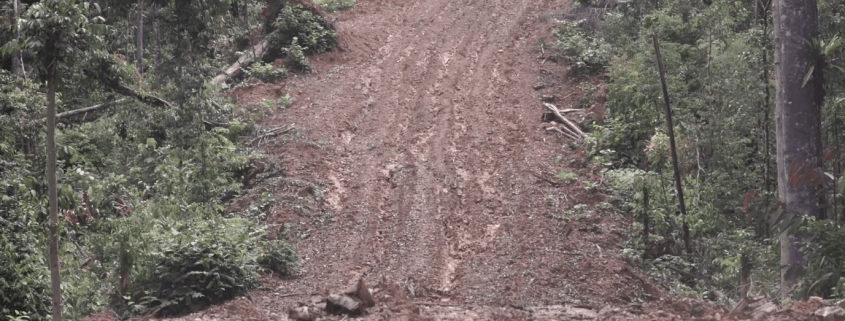 Perusahaan menggarap wilayah adat leluhur masyarakat Long Isun tanpa persetujuan masyarakat, menghancurkan jalan nenek moyang dan tempat berburu masyarakat. (Angus MacInnes, 2017)
Perusahaan menggarap wilayah adat leluhur masyarakat Long Isun tanpa persetujuan masyarakat, menghancurkan jalan nenek moyang dan tempat berburu masyarakat. (Angus MacInnes, 2017)
Di Kalimantan Timur, sebagai contoh, antara tahun 2012 dan 2016, luas lahan yang diperuntukkan untuk perkebunan kelapa sawit meningkat sebanyak 36% dan kabupaten-kabupaten penghasil kelapa sawit terbesar berada di wilayah perbatasan. Sementara itu jumlah konflik tanah yang tercatat meningkat sangat besar. Laporan ini menyoroti sejumlah studi kasus dari masyarakat yang terkena dampak di seluruh wilayah perbatasan Kalimantan untuk mengarisbawahi hal ini.
Salah satu contohnya adalah konflik yang sedang berlangsung antara perusahaan kelapa sawit, PT Ledo Lestari, dan masyarakat Dayak Iban Semunying di Kabupaten Bengkayang di mana puluhan keluarga telah dipindahkan, ditempatkan di ‘kamp perusahaan’, hutan dan tanah adat mereka diambil alih perusahaan.
Bapak Abulipah, Sekretaris Desa dan juga anggota Dewan Adat Dayak Kecamatan, wakil Masyarakat Adat Dayak Iban Pareh Semunying Jaya menyatakan:
Kami sangat menderita dari konflik-konflik berkepanjangan dengan PT Ledo Lestari sejak tahun 2004. Sekitar 8000 hektar tanah yang didalamnya termasuk 1420 ha hutan adat, 30 ha lokasi sawah dan 117 ha kebun warga dari 10,418.63 ha seluruh wilayah adat kami telah digusur dan ditanami perkebunan kelapa sawit oleh PT Ledo Lestari. Kami menuntut semua dan segera pemulihan hak-hak wilayah adat dan hutan adat kami yang telah diambil, digarap dan dikuasai PT Ledo Lestari tanpa konsultasi maupun persetujuan sebagaimana diakui dan disimpulkan oleh Negara melalui laporan Inkuiri Nasional Komnas HAM tahun 2016.
Laporan situasi di Kalimantan Timur sama buruknya. Dalam 16 tahun terakhir, perkebunan kelapa sawit telah meluas dari 117.000 hektar menjadi 1,2 juta hektar. Selain itu, saat ini, 71% hutan di Kalimantan Timur telah berada di tangan perusahaan kehutanan, yaitu sekitar 5,9 juta hektar, dan area ini mencakup 642 desa adat. Ini adalah situasi yang lazim terjadi di wilayah perbatasan dan, mengutip Komite CERD PBB, disebabkan oleh hukum dan praktik Indonesia yang diskriminatif yang “menolak hak [masyarakat adat] atas tanah mereka demi hak kepemilikan yang dimiliki Negara” di perusahaan-perusahaan swasta.
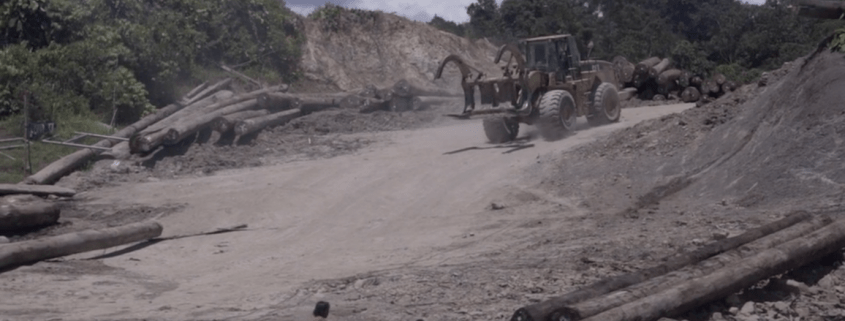 Perusahaan pembalakan bekerja diperbatasan antar-kabupaten. Camp perusahaan PT Kemakmuran Berkah Timber (Roda Mas Group). (Angus MacInnes, 2017)
Perusahaan pembalakan bekerja diperbatasan antar-kabupaten. Camp perusahaan PT Kemakmuran Berkah Timber (Roda Mas Group). (Angus MacInnes, 2017)
Di Kabupaten Mahakam Ulu, sebagai contoh, ada dua puluh konsesi penebangan yang tersebar di Mahakam Ulu, termasuk satu konsesi yang mencakup sekitar 13.000 hektar tanah leluhur masyarakat adat Dayak Bahau Busaang dari Long Isun. Warga di Long Isun tidak diberitahu sama sekali mengenai masalah ini sampai kegiatan kehutanan dimulai di salah satu area tanah mereka pada tahun 2014. Ketika warga mengeluh, mereka dihadapkan dengan intimidasi dan kriminalisasi. Perwakilan desa ditangkap dan seorang aktivis terkemuka masyarakat dipenjara selama lebih dari tiga bulan. Meskipun berbagai instansi pemerintah mengetahui situasi ini, perusahaan terus beroperasi tanpa hukuman.
Sementara pengembangan infrastruktur lebih lanjut akan menguntungkan perusahaan-perusahaan ini, hal itu diwujudkan dengan mengorbankan masyarakat adat, yang tanahnya juga akan disediakan untuk ekspansi kelapa sawit. Di Long Isun, misalnya, jalan yang direncanakan akan menembus wilayah leluhur mereka. Jika berjalan terus sebelum hak-hak tanah mereka diamankan, hal ini bisa membawa konsekuensi menghancurkan yang sangat besar bagi masyarakat.
Kepala Adat Long Isun, Lusang Aran, saat ini mencatat pengajuan berikut ini:
“Long Isun sedang berjuang untuk pengakuan Perlindungan Masyarakat Hukum Adat melalui Peraturan Daerah Kabupaten Mahakam Ulu; masyarakat Secara tegas menolak hadirnya Investasi yang akan masuk kedalam wilayah Long Isun baik perkebunan seklala besar Perusahaan sawit dan Penebangan Kayu;dan melarang seluruh aktivitas eksploitasi Sumber Daya Alam yang ada dalam wilayah Kampung Long Isun baik secara perorangan maupun Badan Usaha (Perusahaan Besar Swasta), Jenis Sumber Daya Alam Mineral Logam dan Batuan adalah Emas, Perak, Intan, Logam, Bauksit, Timah, Tembaga, Biji Besi dan Nikel. Kemudian Mineral bukan Logam berupa Batu Kapur, Marmer, Belerang, Fosfat, Batu Bara.”
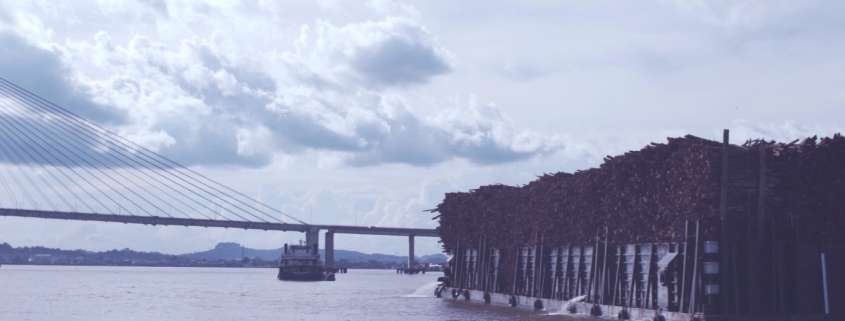 Kayu yang diolah dikirim menuju perusahaan-perusahaan pengolah kayu yang berada di Samarinda, Kalimantan Timur (Angus MacInnes, 2018)
Kayu yang diolah dikirim menuju perusahaan-perusahaan pengolah kayu yang berada di Samarinda, Kalimantan Timur (Angus MacInnes, 2018)
Proses yang sama sekarang terjadi di Provinsi Kalimantan Utara yang baru dimekarkan. Perkebunan kelapa sawit dan konsesi lainnya sudah menjadi fitur yang menonjol dan mengikuti jaringan jalan daerah perbatasan yang terus berkembang. Bahkan penelitian akademis yang diterbitkan tahun 2019 menyoroti bahwa “jalan raya dan jalur kereta api yang direncanakan ini akan merusak apa yang merupakan blok hutan terbesar yang tersisa,” termasuk wilayah adat yang belum diatur secara hukum yang menjadi bagian luas dari wilayah ini. Karena alasan inilah koalisi masyarakat adat dan masyarakat sipil telah mengirimkan laporan kepada Komite CERD PBB.
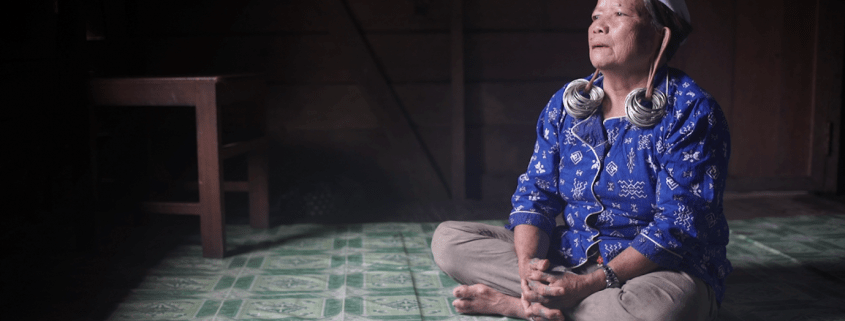 Foto: Christina Lawing Yeq, tokoh spiritual Long Isun (Angus, 2018)
Foto: Christina Lawing Yeq, tokoh spiritual Long Isun (Angus, 2018)
Pengabaian negara Indonesia terhadap kewajiban internasionalnya dalam hal ini tidak dapat dibiarkan terus dan kerusakan yang tidak dapat dipulihkan yang telah terjadi dan yang akan terus meluas dan meningkat mengundang dan memaksa adanya pengawasan dan tindakan internasional. Terutama setelah krisis COVID-19 yang sedang berlangsung, yang sedang digunakan untuk pembahasan Omnibus Law yang menerapkan proses deregulasi menyeluruh, yang mencakup lebih dari 1.200 amandemen terhadap setidaknya 80 undang-undang yang ada. Yang paling utama dari usulan perubahan ini termasuk penghapusan penilaian dampak lingkungan dan sosial sebagai prasyarat untuk penerbitan izin usaha berbagai macam proyek, dari proyek infrastruktur hingga pengembangan pertanian.
Dengan demikian, para oraganisasi penandatangan yang mengajukan laporan kepada Komite CERD PBB untuk mendesak Indonesia:
- segera menangguhkan Mega Projek KBOP yang diperluas, operasi perkebunan kelapa sawit atau penebangan hutan mana pun di wilayah tersebut, dan pembangunan infrastruktur terkait sampai pemerintah telah mengamankan hak kepunyaan dan kepemilikan masyarakat adat atas tanah yang dicakup oleh sistem penguasaan adat mereka dan persetujuan bebas, didahulukan dan diinformasikan (FPIC) masyarakat adat;
- mempercepat pengesahan RUU Pengakuan dan Perlindungan Hak-Hak Masyarakat Adat, setelah menjamin partisipasi dan persetujuan masyarakat adat yang mereka putuskan dengan matang, dan mengamandemen atau memberlakukan undang-undang terkait lainnya, termasuk yang berkaitan dengan peradilan yang non-diskriminatif dan efektif serta solusi-solusi lain yang memperhitungkan karakteristik adat (misalnya, mencerminkan hak-hak yang timbul dari sistem penguasaan adat)
Pada tahun 2007, Komite CERD PBB mendapati bahwa undang-undang Indonesia telah gagal untuk memberikan perlindungan yang efektif kepada masyarakat adat, sebuah kesimpulan yang sejak itu telah disuarakan oleh berbagai badan perjanjian PBB lainnya, Prosedur Khusus PBB serta Mahkamah Konstitusi dan Komnas HAM. Komite CERD PBB secara khusus membahas Mega Projek KBOP yang asli, menyarankan agar Negara “mengamankan hak kepunyaan dan kepemilikan masyarakat setempat sebelum melanjutkan Rencana ini.” Komite CERD PBB menyatakan bahwa “perkebunan kelapa sawit terus dikembangkan di tanah masyarakat adat di wilayah perbatasan Kalimantan tanpa ada upaya nyata dari Negara Indonesia untuk mematuhi rekomendasi Komite CERD PBB atau untuk mengamankan dan melindungi hak-hak masyarakat adat.”
Sudah saatnya bagi Komite CERD PBB untuk mengambil keputusan resmi dan merekomendasikan agar Indonesia segera mengambil langkah-langkah yang diperlukan untuk memastikan penghormatan dan melindungi hak-hak masyarakat adat di Indonesia.
Contact person:
Monica Kristiani Ndoen (+62 857-7535-3307)
Nikodemus Ale (+62 812-5686-5454)
Norman Jiwan, Indonesia (+6281315613536)
Angus MacInnes (+44(0)7526819460)
Daftar organisasi yang menyampaikan laporan:
- AliansiMasyarakat Adat Nusantara (PB AMAN)
- Aliansi Masyarakat Adat Nusantara Pengurus Wilayah Kalimantan Barat, Pontianak, Kalimantan Barat
- Aliansi Masyarakat Adat Nusantara Pengurus Daerah Bengkayang, Singkawang dan Sambas, Bengkayang, Kalimantan Barat
- Institut Dayakologi (ID), Pontianak, Kalimantan Barat
- Lembaga Bela Banua Talino (LBBT), Pontianak, Kalimantan Barat
- LembagaBentang Alam Hijau (LemBAH), Pontianak, Kalimantan Barat
- Lembaga Studi dan Advokasi Masyarakat/ELSAM, DKI Jakarta
- Perkumpulan Nurani Perempuan (PNP), Samarinda, Kalimantan Timur
- Perkumpulan Sawit Watch, Bogor, Jawa Barat
- Perkumpulan Untuk Pembaharuan Hukum Berbasis Masyarakat dan Ekologis/HuMA, DKI Jakarta
- Transformasi untuk Keadilan Indonesia (TuK INDONESIA), DKI Jakarta
- Wahana Lingkungan Hidup Indonesia, WALHI Eksekutif Nasional, DKI Jakarta
- Wahana Lingkungan Hidup Indonesia Kalimantan Barat (WALHI Kalbar), Pontianak, Kalimantan Barat
- Yayasan Padi Indonesia, Kalimantan Timur
- Forest Peoples Programme, Inggris dan Belanda
This post is also available in: English
